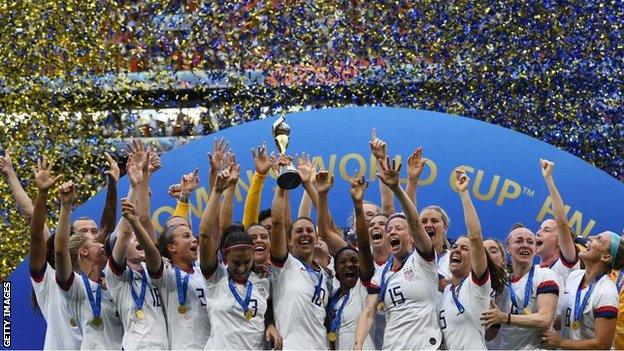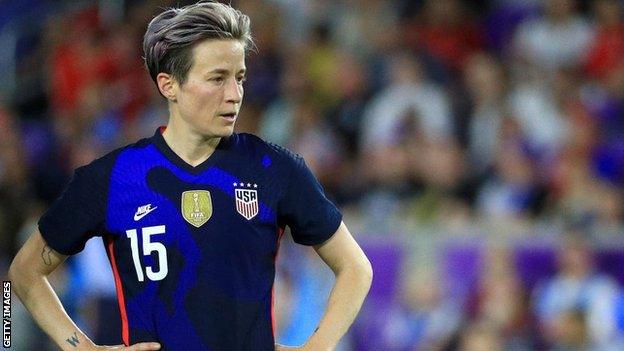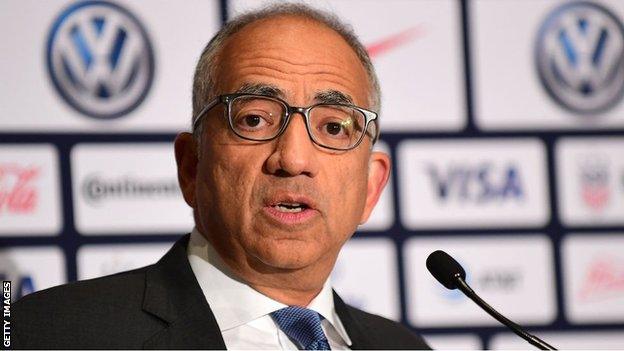Male footballers should earn more than women... according to US football authorities
- Published

The US Women's team won the last World Cup. The men's team did not even qualify for Russia 2018
The US women's football team is less skilled and has fewer responsibilities than their male colleagues, according to US Soccer.
Lawyers for the football governing body in the US have submitted the claims in legal papers, external as part of a lawsuit over equal pay filed by 28 women's national team players - the court trial is expected to start on 5 May.
It stated that the job of a male footballer on the national team "requires a higher level of skill based on speed and strength" than their female counterparts.
'Plain sexism'

The lawsuit is led by star athletes such as World Player of the Year Megan Rapinoe
While the men's national team has never won a relevant international title, the women's side are four-time world champions and have won five Olympic gold medals.
American women footballers also outdid men in terms of revenue in the last few years: it has emerged, external that the women's team generated more money from ticket sales than the men's side between 2016 and 2018.
However, the male athletes serving the national team are disproportionally paid more, according to lawyers representing the group of female players.
They claim, for example, that women can earn a maximum $4,950 (£3,858) bonus per friendly game played for the national team, while the men's pay topped $13,000 (£10,132).
"Literally everyone in the world understands that an argument male players 'have more responsibility' is just plain simple sexism," Molly Levinson, a spokesperson for the players, said in a statement.
"It also illustrates the very gender discrimination that caused us to file this lawsuit to begin with."
The group of players took legal action on 8 March 2019, seeking equal pay and $66m (£51.4m) in damages for lost earnings.
They also accused governing body US Soccer of "institutionalised gender discrimination".
That happened before the women's team took part in - and won - the 2019 Women's World Cup in France.
Megan Rapinoe, one of the side's stars, is adamant about the group's resolve.
"We won't accept anything less than equal pay," she said in an interview with ABC TV channel last August.
"We show up for a game, if we win the game, if we lose the game, if we tie the game, we want to be paid equally, period."
Equal pay offer
The women's case was publicly supported by male players.
On 12 February the US men's team issued a statement criticising the governing body in no uncertain terms.
"Yes, the federation continues to discriminate against the women in their wages and working conditions," the statement read., external
Kirsten Schlewitz, a US journalist who specialises in women's football, told the BBC that public perception is also favourable to the plight of the female players.
"Almost all fans in the US see the women's team as one of the few things that have gone right in US football," she said.
"Then US Soccer, which most fans already had little time for, made degrading and dismissive remarks about how the women weren't earning their keep."
US Soccer president Carlos Cordeiro released an open letter, external on 7 March saying that the governing body had made multiple attempts to meet with the women's national team.
Prize money gap

Carlos Cordeiro, US Soccer's president, says that the organisation offered equal pay in matches under its control
Cordeiro claimed that US Soccer had offered an equal pay package for matches under its control.
But the governing body did not offer compensation for the difference in prize money paid to men and women's teams at World Cups, as they are of responsibility of Fifa, the global governing body.
The last men's World Cup champions France received $38m (£29.6m) after winning the tournament in Russia, in 2018.
The US women's team however, went home with $4m (£3.1m) for winning the trophy last year.